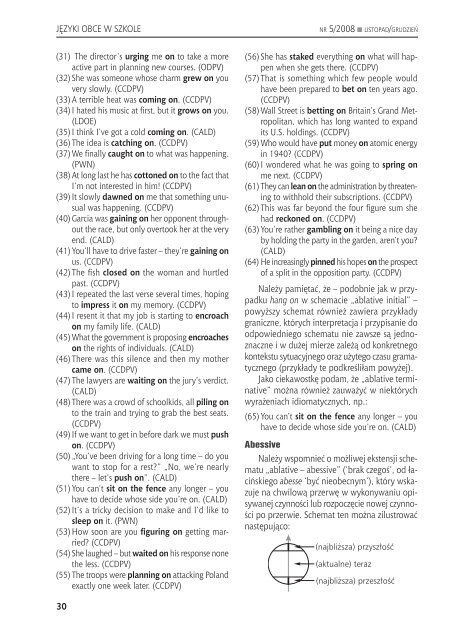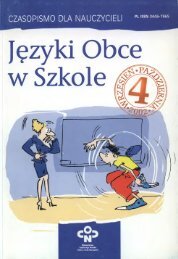JÄzyki Obce w Szkole - Biblioteka Cyfrowa OÅrodka Rozwoju Edukacji
JÄzyki Obce w Szkole - Biblioteka Cyfrowa OÅrodka Rozwoju Edukacji
JÄzyki Obce w Szkole - Biblioteka Cyfrowa OÅrodka Rozwoju Edukacji
You also want an ePaper? Increase the reach of your titles
YUMPU automatically turns print PDFs into web optimized ePapers that Google loves.
Języki <strong>Obce</strong> W <strong>Szkole</strong> n r 5/2008 l i s t o p a d/g r u d z i e ń<br />
(31) The director’s urging me on to take a more<br />
active part in planning new courses. (ODPV)<br />
(32) She was someone whose charm grew on you<br />
very slowly. (CCDPV)<br />
(33) A terrible heat was coming on. (CCDPV)<br />
(34) I hated his music at first, but it grows on you.<br />
(LDOE)<br />
(35) I think I’ve got a cold coming on. (CALD)<br />
(36) The idea is catching on. (CCDPV)<br />
(37) We finally caught on to what was happening.<br />
(PWN)<br />
(38) At long last he has cottoned on to the fact that<br />
I’m not interested in him! (CCDPV)<br />
(39) It slowly dawned on me that something unusual<br />
was happening. (CCDPV)<br />
(40) Garcia was gaining on her opponent throughout<br />
the race, but only overtook her at the very<br />
end. (CALD)<br />
(41) You’ll have to drive faster – they’re gaining on<br />
us. (CCDPV)<br />
(42) The fish closed on the woman and hurtled<br />
past. (CCDPV)<br />
(43) I repeated the last verse several times, hoping<br />
to impress it on my memory. (CCDPV)<br />
(44) I resent it that my job is starting to encroach<br />
on my family life. (CALD)<br />
(45) What the government is proposing encroaches<br />
on the rights of individuals. (CALD)<br />
(46) There was this silence and then my mother<br />
came on. (CCDPV)<br />
(47) The lawyers are waiting on the jury’s verdict.<br />
(CALD)<br />
(48) There was a crowd of schoolkids, all piling on<br />
to the train and trying to grab the best seats.<br />
(CCDPV)<br />
(49) If we want to get in before dark we must push<br />
on. (CCDPV)<br />
(50) „You’ve been driving for a long time – do you<br />
want to stop for a rest?” „No, we’re nearly<br />
there – let’s push on”. (CALD)<br />
(51) You can’t sit on the fence any longer – you<br />
have to decide whose side you’re on. (CALD)<br />
(52) It’s a tricky decision to make and I’d like to<br />
sleep on it. (PWN)<br />
(53) How soon are you figuring on getting married?<br />
(CCDPV)<br />
(54) She laughed – but waited on his response none<br />
the less. (CCDPV)<br />
(55) The troops were planning on attacking Poland<br />
exactly one week later. (CCDPV)<br />
(56) She has staked everything on what will happen<br />
when she gets there. (CCDPV)<br />
(57) That is something which few people would<br />
have been prepared to bet on ten years ago.<br />
(CCDPV)<br />
(58) Wall Street is betting on Britain’s Grand Metropolitan,<br />
which has long wanted to expand<br />
its U.S. holdings. (CCDPV)<br />
(59) Who would have put money on atomic energy<br />
in 1940? (CCDPV)<br />
(60) I wondered what he was going to spring on<br />
me next. (CCDPV)<br />
(61) They can lean on the administration by threatening<br />
to withhold their subscriptions. (CCDPV)<br />
(62) This was far beyond the four figure sum she<br />
had reckoned on. (CCDPV)<br />
(63) You’re rather gambling on it being a nice day<br />
by holding the party in the garden, aren’t you?<br />
(CALD)<br />
(64) He increasingly pinned his hopes on the prospect<br />
of a split in the opposition party. (CCDPV)<br />
Należy pamiętać, że – podobnie jak w przypadku<br />
hang on w schemacie „ablative initial” –<br />
powyższy schemat również zawiera przykłady<br />
graniczne, których interpretacja i przypisanie do<br />
odpowiedniego schematu nie zawsze są jednoznaczne<br />
i w dużej mierze zależą od konkretnego<br />
kontekstu sytuacyjnego oraz użytego czasu gramatycznego<br />
(przykłady te podkreśliłam powyżej).<br />
Jako ciekawostkę podam, że „ablative terminative”<br />
można również zauważyć w niektórych<br />
wyrażeniach idiomatycznych, np.:<br />
(65) You can’t sit on the fence any longer – you<br />
have to decide whose side you’re on. (CALD)<br />
Abessive<br />
Należy wspomnieć o możliwej ekstensji schematu<br />
„ablative – abessive” (‘brak czegoś’, od łacińskiego<br />
abesse ‘być nieobecnym’), który wskazuje<br />
na chwilową przerwę w wykonywaniu opisywanej<br />
czynności lub rozpoczęcie nowej czynności<br />
po przerwie. Schemat ten można zilustrować<br />
następująco:<br />
30
















